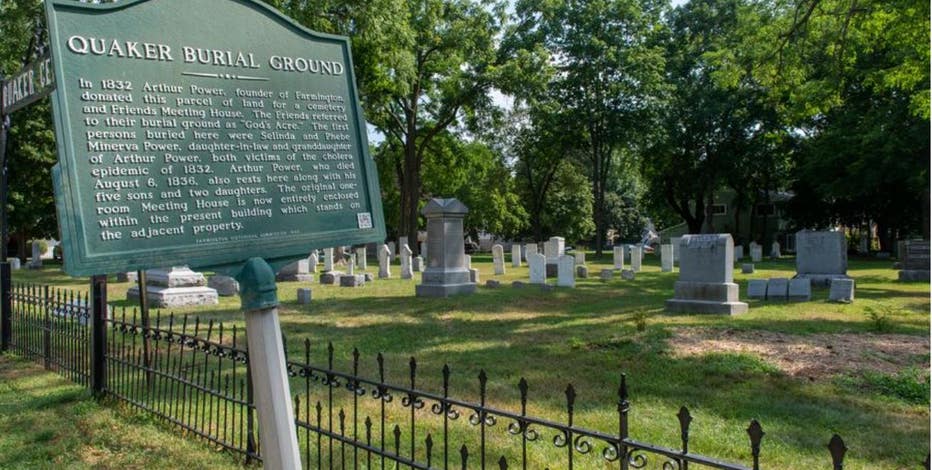Underground Railroad destination in Canada shares intimate connection with its citizens
Underground Railroad destination celebrates 100th Homecoming Day
The town of Buxton, Ontario may seem like a quaint slice of North American life. That may be true, but it's also baked in history as a city founded by former slaves who escaped the U.S. for a better life. That's where FOX 2's Lori Pinson takes us for their 100th Homecoming Day.
BUXTON, On.(FOX 2) - For Brian Maxey, there's much more to the soil he stands on and the community that surrounds him than what you can see.
Though he can't see it, he definitely feels the connection to the Earth in Buxton, Ontario. For him, it's more than just any old home.
"When you see it just keep going back and back and back, you're like, ‘I’m from here. This is ours'," Maxey said, "so not only do we belong, but we really belong. We built this as much as anybody else, if not more. So it pushes me to keep building on that."
Buxton is a special place with intimate ties to Michigan and U.S. history. It was the final destination for those escaping slavery. The Underground Railroad traveled through Michigan, a free state during the time period that included slavery.
But making it to the north didn't always mean freedom, which is why Canada became a special place.
When it was settled in the 1800s, Buxton was built with churches and schools and residences that housed over a thousand people seeking freedom. Those roots first started to grow with the aid of Rev. William King, according to Shannon Prince, curator of the Buxton museum.
"So when you arrived, you received 50 acres, you had 10 years to pay it off. Your home had to be a certain size. There was a court of arbitration. There was no alcohol," she said.
King levied those rules because he believed, if given the same opportunities as whites, Black people could become self-sufficient and self-sustaining, Prince said. And she would know, living as a direct descendant of Buxton's earliest settlers. She knew pretty early on that she never wanted to live anywhere else.
"I married the boy next door and we've been here all of our lives and when we had children they went away to school, and now they've returned to have ther families here and that's that next generation who will continue the rich legacy that's been entrusted to us by our ancestors," said Prince.
RELATED: Follow the Michigan Freedom Trail here
Those ties run deep and are part of the reason that generations of people have remained in the community.
Buxton is located about an hour from the Detroit-Windsor border.
It's now home to an annual celebration where thousands visit from all over North America. The homecoming fanfare celebrates Buxton and in 2023, they put on their 100th anniversary. The first homecoming gathering happened near an old pear tree that still stands in a farm field.
Many people, like Christina Bell Allison made the pilgrimage for the most recent event.
"I connect with all my relatives that come from Georgia, from Texas, from Detroit, from Southfield and it's just a great celebration just to be with your family," the Southfield native said.
Another Buxton descendant said she left for university but later returned. "Since I've been back, it's definitely felt like home. It's important to be able to recognize your roots and to understand and to be able to recognize the importance you have," said Heather Robbins.
For Juneau Robbins, who now lives in Minneapolis, Minnesota, there's strength in the history the community has.
"As Black people, I think we can do for self. I think there's no excuses. So much has been thrown against us, but when we have the ability to do better, and we want to do better, we often do, do better. Regardless of what comes our way."
Much of that history wasn't just made in the town. Many of its settlers that worked the land and built businesses in Buxton also fought in the American Civil War. They were part of the 102nd Colored Infantry of Michigan.
And when they returned, according to author Craig Shreve, they turned the city into a destination for those looking for a better education. That's why he picked the one-room school house for a book signing.
His novel, which follows the true story of a former 16th century slave who became the first foreign born samurai, channels the same fortitude of the people of Buxton.
"I think my background from Buxton did affect the way I looked at the story because I always thought of the history of Buxton as that of Black people given an opportunity," Shreve said. "I mean I was giving a talk the other day and I said that Black history exists everywhere there are Black people.
"All of our stories are important, especially in the face of some efforts in certain areas to try to diminish that."


